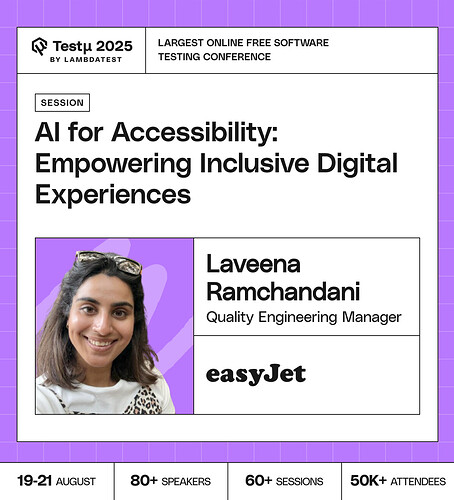Join Laveena Ramchandani, Test Manager and community leader in data science testing, for AI for Accessibility: Empowering Inclusive Digital Experiences. Discover how AI can break barriers and support more inclusive design, development, and testing.
From automated alt text and intelligent screen readers to predictive input and real-time captions, you’ll explore practical applications of AI that make digital products more accessible. Laveena also addresses the ethical side of AI, ensuring human agency stays at the center of inclusive innovation.
 Save your spot today and learn how AI can shape a more accessible future! Register now
Save your spot today and learn how AI can shape a more accessible future! Register now
Does screen reading AI testing can be automated?
What are the most impactful AI-powered accessibility tools currently in use?
How can ai accessibility testing be useful for multi language localisation testing?
Are there any tools for usability testing that can display the metrics as well?
What strategies do you suggest for testing AI powered accessibility tools in real world noisy environment like voice assistants being used in noisy places?
Will AI take over software engineers in the next 10 years?
How might generative AI shape the next wave of accessibility innovations?
Which impactful AI-powered tools are most impactful now?
What accessibility testing challenges are most urgent for AI to address?
What are the most effective ways to integrate accessibility testing early into the CI/CD pipeline, especially for enterprise applications like SAP?
Can AI accessibility testing be useful for OCR based testing methods?
What is the commonly used AI tool by Qas?
How do I test for accessibility for my application ?
Can AI-powered testing tools themselves be developed and deployed inclusively, including bias and training and cultural sensitivity factors?
From the audio side, as AI advances, how can we develop new AI models that can understand and adapt to the complexities of natural language, diverse accents, and speech patterns (including those with impairments) to enable greater accessibility?
How do you prevent AI from inheriting human biases and creating new accessibility barriers?
Any AI tool for end to end testing for fresher.
Which accessibility issues is AI uniquely bad at catching, and why?
How can AI assist in identifying accessibility issues that traditional automated tools often miss?
![]() Save your spot today and learn how AI can shape a more accessible future! Register now
Save your spot today and learn how AI can shape a more accessible future! Register now